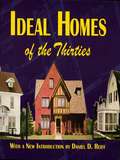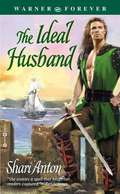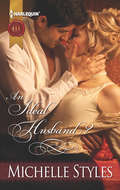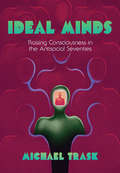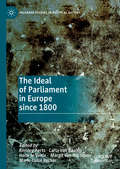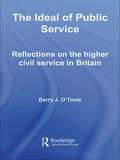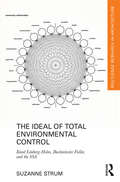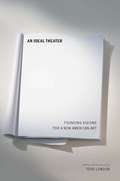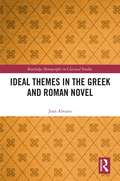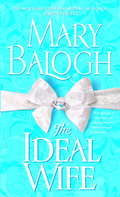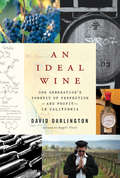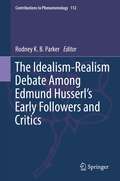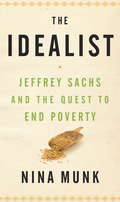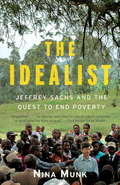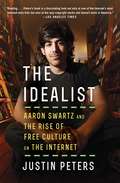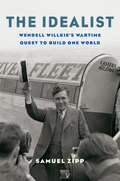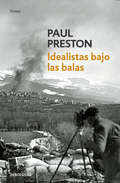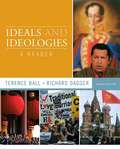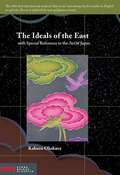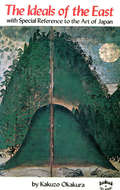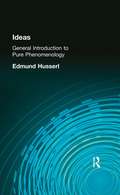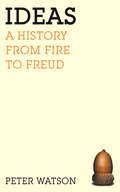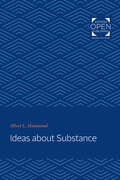- Table View
- List View
Ideal Homes of the Thirties (Dover Architecture)
by Ideal Homes Daniel ReiffAdapted from a rare 1933 catalog, this volume showcases sixty plans for two-story houses. It features photographs (most in full color), floor plans, and descriptive text that depict a splendid variety of economic styles, including colonial, mission, foursquare, and bungalow. Each house appears in a two-page spread, forming an elegant and highly readable presentation.The Plan Service Company of St. Paul, Minnesota, published a series of Ideal Homes catalogs in the 1920s and '30s. This particular issue has been long out of print, and its reissue offers professional architects and armchair renovators alike an authentic look at houses of the era. Daniel D. Reiff, an expert on vintage house design catalogs, provides an informative introduction.
The Ideal Husband
by Shari AntonWhile reluctantly traveling home to Pecham, lovely Leah meets Geoffrey Hamelin, who sees her to safety when their ship goes down in the English Channel. Refusing to abandon the gallant stranger who saved her life, Leah plucks an unconscious, badly wounded Geoffrey from the sea. When everyone mistakes them for husband and wife, Leah decides to take advantage of the situation by bringing Geoffrey home with her to help salvage what is left of her tattered reputation after she ran off with an unfaithful scoundrel. No one expects Geoffrey to survive, but he awakens, albeit with no memory of who or where he is. Leah decides to tempt fate by continuing her deception, but she can't help wondering what will happen to her when her new husband regains his memory.
An Ideal Husband?
by Michelle StylesTo marry a rakeWhen heiress Sophie Ravel finds herself in a compromising situation, notorious Richard Crawford, Viscount Bingfield, swoops in and saves her reputation. She might have escaped the attentions of one undesirable, but will Richard's protection expose her to even more scandal?Richard curses his impetuousness at offering a betrothal in the heat of the moment. He gladly accepts Sophie's terms that their engagement remain a pretense...until, quite by chance, he unlocks his shy fiancée's passionate nature. Now nothing will steer him from wedding-then bedding-his blushing bride....
Ideal Minds: Raising Consciousness in the Antisocial Seventies
by Michael TraskFollowing the 1960s, that decade's focus on consciousness-raising transformed into an array of intellectual projects far afield of movement politics. The mind's powers came to preoccupy a range of thinkers and writers: ethicists pursuing contractual theories of justice, radical ecologists interested in the paleolithic brain, seventies cultists, and the devout of both evangelical and New Age persuasions. In Ideal Minds, Michael Trask presents a boldly revisionist argument about the revival of subjectivity in postmodern American culture, connecting familiar figures within the seventies intellectual landscape who share a commitment to what he calls "neo-idealism" as a weapon in the struggle against discredited materialist and behaviorist worldviews.In a heterodox intellectual and literary history of the 1970s, Ideal Minds mixes ideas from cognitive science, philosophy of mind, moral philosophy, deep ecology, political theory, science fiction, neoclassical economics, and the sociology of religion. Trask also delves into the decade's more esoteric branches of learning, including Scientology, anarchist theory, rapture prophesies, psychic channeling, and neo-Malthusianism. Through this investigation, Trask argues that a dramatic inflation in the value of consciousness and autonomy beginning in the 1970s accompanied a growing argument about the state's inability to safeguard such values. Ultimately, the thinkers Trask analyzes—John Rawls, Arne Naess, L. Ron Hubbard, Hal Lindsey, Philip Dick, Ursula Le Guin, Edward Abbey, William Burroughs, John Irving, and James Merrill—found alternatives to statism in conditions that would lend intellectual support to the consolidation of these concepts in the radical free market ideologies of the 1980s.
The Ideal of Parliament in Europe since 1800 (Palgrave Studies in Political History)
by Henk Te Velde Remieg Aerts Carla Van Baalen Margit van der Steen Marie-Luise ReckerThis edited collection explores the perceptions and memories of parliamentarianism across Europe, examining the complex ideal of parliament since 1800. Parliament has become the key institution in modern democracy, and the chapters present the evolution of the ideal of parliamentary representation and government, and discuss the reception and value of parliament as an institution. It is considered both as a guiding concept, a Leitidee, as well as an ideal, an Idealtypus. The volume is split into three sections. The establishment of parliament in the nineteenth century and the transfer of parliamentary ideals, models and practices are described in the first section, based on the British and French models. The second part explores how the high expectations of parliamentary democracy in newly-established states after the First World War gradually started to subside into dissatisfaction. Finally, the last section attests to its resilience after the Second World War, demonstrating the strength of the ideal of parliament and its power to incorporate criticism. Examining the history of parliament through concepts and ideals, this book traces a transnational, European exchange of models, routines and discourse.
The Ideal of Public Service: Reflections on the Higher Civil Service in Britain (Routledge Studies in Governance and Public Policy #Vol. 10)
by Barry O'TooleA close examination of the ethics of higher civil servants in Britain and how they have been undermined by recent developments in public administration. Barry O'Toole tackles key questions such as: how should public servants behave? how should they be encouraged to think ethically? how should they be motivated to do so? Focusing on the role of public service, public duty and the public interest in the twenty-first century, O’Toole answers these important questions and looks at the emergence of ‘new public management’, the increasingly important role of 'special advisers' and the decline of the public service ethos under New Labour. The Ideal of Public Service explores some of the key contributions to the development of ideas about public service in the context of British central administration and provides a discussion of recent trends in administrative practice in the UK. Combining political theory and an analysis of the history and development of the civil service, this timely book will be of strong interest to those researching British Politics, Governance and Public Policy.
The Ideal of Total Environmental Control: Knud Lönberg-Holm, Buckminster Fuller, and the SSA (Routledge Research in Architecture)
by Suzanne StrumThis book traces the ideal of total environmental control through the intellectual and geographic journey of Knud Lönberg- Holm, a forgotten Danish architect who promoted a unique systemic, cybernetic, and ecological vision of architecture in the 1930s. A pioneering figure of the new objectivity and international constructivism in Germany in 1922 and a celebrated peer of radical figures in De Stijl, the Bauhaus, and Russian constructivism, when he emigrated to Detroit in 1923 he introduced the vanguard theory of productivism through his photography, essays, designs, and pedagogy. By following Lönberg- Holm’s ongoing matrix of relations until the postwar era with the European vanguards in CIAM and former members of the Structural Study Associates (SSA), especially Fuller, Frederick Kiesler, and C. Theodore Larson, this study shows how their definition of building as a form of environmental control anticipated the contemporary disciplines of industrial ecology, industrial metabolism, and energy accounting.
An Ideal Theater
by Todd LondonAn Ideal Theater is a wide-ranging, inspiring documentary history of the American theatre movement as told by the visionaries who goaded it into being. This anthology collects over forty essays, manifestos, letters and speeches that are each introduced and placed in historical context by the noted writer and arts commentator, Todd London, who spent nearly a decade assembling this collection. This celebration of the artists who came before is an exhilarating look backward, as well as toward the future, and includes contributions from:Jane Addams William Ball Julian Beck Herbert Blau Angus Bowmer Bernard Bragg Maurice Browne Robert Brustein Alison Carey Joseph Chaikin Harold Clurman Dudley Cocke Alice Lewisohn Crowley Gordon Davidson R. G. Davis Doris Derby W. E. B. Du Bois Zelda Fichandler Hallie Flanagan Eva Le Gallienne Robert E. Gard Susan Glaspell André Gregory Tyrone Guthrie John Houseman Jules Irving Margo Jones Frederick H. Koch Lawrence Langner W. McNeil Lowry Charles Ludlam Judith Malina Theodore Mann Gilbert Moses Michaela O'Harra John O'Neal Joseph Papp Robert Porterfield José Quintero Bill Rauch Bernard Sahlins Richard Schechner Peter Schumann Maurice Schwartz Gary Sinise Ellen Stewart Lee Strasberg Luis Miguel Valdez Nina Vance Douglas Turner WardAs well as the founding visions of theatres from across the country:The Actors Studio The Actor's Workshop Alley Theatre American Conservatory Theater American Repetory Theater Arena Stage Barter Theatre Bread and Puppet Theater The Carolina Playmakers The Chicago Little Theater Circle in the Square Theatre The Civic Repertory Theatre Cornerstone Theater Company The Federal Theatre Project Ford Foundation Program in Humanities and the Arts The Free Southern Theater The Group Theatre The Hull-House Dramatic Association KRIGWA Players The Living Theatre La MaMa Experimental Theatre Club The Mark Taper Forum The Mercury Theatre Minnesota Theater Company (Guthrie Theater) The National Theatre of the Deaf The Negro Ensemble Company The Negro Theatre Project, Federal Theatre Project The Neighborhood Playhouse New Dramatists The New York Shakespeare Festival The Open Theater Oregon Shakespeare Festival The Performance Group The Provincetown Players The Repertory Theater of Lincoln Center The Ridiculous Theatrical Company Roadside Theater The San Francisco Mime Troupe The Second City Steppenwolf Theatre Company El Teatro Campesino Theater '47 The Theatre Guild The Theatre of the Living Arts The Washington Square Players The Wisconsin Idea Theater Yale Repertory Theatre The Yiddish Art TheatreTodd London is in his 18th season as artistic director of New Dramatists, the nation's oldest center for the creative and professional development of American playwrights. In 2009 Todd became the first recipient of Theatre Communications Group's (TCG) Visionary Leadership Award for "an individual who has gone above and beyond the call of duty to advance the theater field as a whole, nationally and/or internationally." He's the author of The Importance of Staying Earnest: Writings from Inside the American Theatre, 1988-2013 (NoPassport Press), Outrageous Fortune: The Life and Times of the New American Play (with Ben Pesner, Theatre Development Fund), The Artistic Home (TCG), and The World's Room, a novel (Steerforth Press), among others. His column, "A Lover's Guide to American Playwrights," tributes to contemporary
Ideal Themes in the Greek and Roman Novel (Routledge Monographs in Classical Studies)
by Jean AlvaresThis book explores the areas in which novels such as Chariton’s Callirhoe and Heliodorus’s Aithiopika are ideal beyond the ideal love relationship and considers how concepts of the ideal connect to archetypal and literary patterns as well as reflecting contemporary ideological and cultural elements. Readers will gain a better understanding of how necessary is an understanding of these ideal elements to a full understanding of the novels’ possible readings and their reader’s attitudes. This book sets forth critical methods, subsequently followed, which allows for this exploration of ideal themes. Ideal Themes in the Greek and Roman Novel will be an invaluable resource for scholars of these novels, as well as ancient narratives and classical literature more generally. Scholars of cultural and utopian studies will also find the book useful, as well as some undergraduate students in all these areas.
The Ideal Wife
by Mary BaloghBONUS: This edition contains an excerpt from Mary Balogh's The Secret Mistress. In this classic tale, New York Times bestselling author Mary Balogh introduces a hero like no other: Miles Ripley, London's most irresistible bachelor, who's about to lose his heart to the last person he ever expected to love--his wife. When Abigail Gardiner knocks at the door of Miles Ripley, Earl of Severn, the last thing she expects is a marriage proposal. Desperate, she'd come to this charismatic stranger's home to plead for her future. Instead she shocks them both by saying yes. Her impulsive decision will have consequences neither she nor her new husband can foresee. For Miles has his own reasons for marrying her. And Abigail is harboring a secret of her own. As distrust gives way to desire . . . as, together, they give in to the pleasures of the marriage bed, a devastating scandal threatens their future. Now these two wary hearts will risk ruin and disgrace for a love that has changed them both forever--the kind all seek, but few ever find.
An Ideal Wine: One Generation's Pursuit of Perfection - and Profit
by David DarlingtonFrom the author of the acclaimed Angels' Visits comes an inside look at how a handful of ingenious winemakers has transformed-and been transformed by-the California wine industry over the past four decades. In the 1970s, a group of idealistic baby boomers was attracted to the seemingly romantic world of winemaking. Over the course of nearly forty years, however-as competition from abroad increased, wine eclipsed beer and spirits as American adults' beverage of choice, critics came to control the marketplace, and corporatization took over the industry-these young aesthetes would learn that wine is an unforgiving business. They would have to be clever to survive in an increasingly cutthroat atmosphere, and no one was more innovative than Randall Grahm of Bonny Doon Vineyard-the court jester and bleeding conscience of California wine, its most original and amusing figure. But Grahm is only one of the restless visionaries who, having chosen wine as the vehicle through which to fulfill their dreams, ended up changing the rules of the industry by adapting to its demands. From high technology to hardball entrepreneurship, from handicapping scores to holistic farming, each vintner operates by his or her own definition of an ideal wine. In this lively, sweeping account that spans the early seventies to the present day, David Darlington employs a sharp journalistic eye to profile a group of wine pioneers. A tale of vision and disillusion, brinksmanship and pragmatism, nature and business, politics and culture, An Ideal Wine is a fascinating look at an ever-evolving industry that reflects the values of our society and our civilization.
The Idealism-Realism Debate Among Edmund Husserl’s Early Followers and Critics (Contributions to Phenomenology #112)
by Rodney K. B. ParkerThis volume aims to contextualize the development and reception of Husserl’s transcendental-phenomenological idealism by placing him in dialogue with his most important interlocutors – his mentors, peers, and students. Husserl’s “turn” to idealism and the ensuing reaction to Ideas I resulted in a schism between the early members of the phenomenological movement. The division between the realist and the transcendental phenomenologists is often portrayed as a sharp one, with the realists naively and dogmatically rejecting all of Husserl’s written work after the Logical Investigations. However, this understanding of the trajectory of the phenomenological movement ignores the extensive and intricate contours of the idealism-realism debate. In addition to helping us better interpret Husserl’s attempts to defend his idealism, reconsidering the idealism-realism debate elucidates the relationship and differences between Husserl's phenomenology and the broader landscape of early 20th century German philosophy, particularly the Munich phenomenologists and the Neo-Kantians. The contributions to this volume reconsider many of the early interpretations and critiques of Husserl, inviting readers to assess the merits of the arguments put forward by his critics while also shedding new light on their so-called “misunderstandings” of his idealism. This text should be of interest to researchers working in the history of phenomenology and Husserlian studies.
The Idealist
by Nina MunkA powerful portrayal of Jeffrey Sachs's ambitious quest to end global poverty "The poor you will always have with you," to cite the Gospel of Matthew 26:11. Jeffrey Sachs--celebrated economist, special advisor to the Secretary General of the United Nations, and author of the influential bestseller The End of Poverty--disagrees. In his view, poverty is a problem that can be solved. With single-minded determination he has attempted to put into practice his theories about ending extreme poverty, to prove that the world's most destitute people can be lifted onto "the ladder of development." In 2006, Sachs launched the Millennium Villages Project, a daring five-year experiment designed to test his theories in Africa. The first Millennium village was in Sauri, a remote cluster of farming communities in western Kenya. The initial results were encouraging. With his first taste of success, and backed by one hundred twenty million dollars from George Soros and other likeminded donors, Sachs rolled out a dozen model villages in ten sub-Saharan countries. Once his approach was validated it would be scaled up across the entire continent. At least that was the idea. For the past six years, Nina Munk has reported deeply on the Millennium Villages Project, accompanying Sachs on his official trips to Africa and listening in on conversations with heads-of-state, humanitarian organizations, rival economists, and development experts. She has immersed herself in the lives of people in two Millennium villages: Ruhiira, in southwest Uganda, and Dertu, in the arid borderland between Kenya and Somalia. Accepting the hospitality of camel herders and small-hold farmers, and witnessing their struggle to survive, Munk came to understand the real-life issues that challenge Sachs's formula for ending global poverty. THE IDEALIST is the profound and moving story of what happens when the abstract theories of a brilliant, driven man meet the reality of human life.
The Idealist
by Nina MunkNAMED ONE OF THE BEST BOOKS OF THE YEAR BY Bloomberg * Forbes * The SpectatorRecipient of Foreign Policy's 2013 Albie AwardA powerful portrayal of Jeffrey Sachs's ambitious quest to end global poverty "The poor you will always have with you," to cite the Gospel of Matthew 26:11. Jeffrey Sachs--celebrated economist, special advisor to the Secretary General of the United Nations, and author of the influential bestseller The End of Poverty--disagrees. In his view, poverty is a problem that can be solved. With single-minded determination he has attempted to put into practice his theories about ending extreme poverty, to prove that the world's most destitute people can be lifted onto "the ladder of development." In 2006, Sachs launched the Millennium Villages Project, a daring five-year experiment designed to test his theories in Africa. The first Millennium village was in Sauri, a remote cluster of farming communities in western Kenya. The initial results were encouraging. With his first taste of success, and backed by one hundred twenty million dollars from George Soros and other likeminded donors, Sachs rolled out a dozen model villages in ten sub-Saharan countries. Once his approach was validated it would be scaled up across the entire continent. At least that was the idea. For the past six years, Nina Munk has reported deeply on the Millennium Villages Project, accompanying Sachs on his official trips to Africa and listening in on conversations with heads-of-state, humanitarian organizations, rival economists, and development experts. She has immersed herself in the lives of people in two Millennium villages: Ruhiira, in southwest Uganda, and Dertu, in the arid borderland between Kenya and Somalia. Accepting the hospitality of camel herders and small-hold farmers, and witnessing their struggle to survive, Munk came to understand the real-life issues that challenge Sachs's formula for ending global poverty. THE IDEALIST is the profound and moving story of what happens when the abstract theories of a brilliant, driven man meet the reality of human life.
The Idealist
by Justin PetersA smart, lively history of the Internet free culture movement and its larger effects on society--and the life and shocking suicide of Aaron Swartz, a founding developer of Reddit and Creative Commons--from Slate correspondent Justin Peters.Aaron Swartz was a zealous young advocate for the free exchange of information and creative content online. He committed suicide in 2013 after being indicted by the government for illegally downloading millions of academic articles from a nonprofit online database. From the age of fifteen, when Swartz, a computer prodigy, worked with Lawrence Lessig to launch Creative Commons, to his years as a fighter for copyright reform and open information, to his work leading the protests against the Stop Online Piracy Act (SOPA), to his posthumous status as a cultural icon, Swartz's life was inextricably connected to the free culture movement. Now Justin Peters examines Swartz's life in the context of 200 years of struggle over the control of information. In vivid, accessible prose, The Idealist situates Swartz in the context of other "data moralists" past and present, from lexicographer Noah Webster to ebook pioneer Michael Hart to NSA whistleblower Edward Snowden. In the process, the book explores the history of copyright statutes and the public domain; examines archivists' ongoing quest to build the "library of the future"; and charts the rise of open access, copyleft, and other ideologies that have come to challenge protectionist IP policies. Peters also breaks down the government's case against Swartz and explains how we reached the point where federally funded academic research came to be considered private property, and downloading that material in bulk came to be considered a federal crime. The Idealist is an important investigation of the fate of the digital commons in an increasingly corporatized Internet, and an essential look at the impact of the free culture movement on our daily lives and on generations to come.
The Idealist: Aaron Swartz and the Rise of Free Culture on the Internet
by Justin PetersThis smart, “riveting” (Los Angeles Times) history of the Internet free culture movement and its larger effects on society—and the life and shocking suicide of Aaron Swartz, a founding developer of Reddit and Creative Commons—written by Slate correspondent Justin Peters “captures Swartz flawlessly” (The New York Times Book Review).Aaron Swartz was a zealous young advocate for the free exchange of information and creative content online. He committed suicide in 2013 after being indicted by the government for illegally downloading millions of academic articles from a nonprofit online database. From the age of fifteen, when Swartz, a computer prodigy, worked with Lawrence Lessig to launch Creative Commons, to his years as a fighter for copyright reform and open information, to his work leading the protests against the Stop Online Piracy Act (SOPA), to his posthumous status as a cultural icon, Swartz’s life was inextricably connected to the free culture movement. Now Justin Peters examines Swartz’s life in the context of 200 years of struggle over the control of information. In vivid, accessible prose, The Idealist situates Swartz in the context of other “data moralists” past and present, from lexicographer Noah Webster to ebook pioneer Michael Hart to NSA whistleblower Edward Snowden. In the process, the book explores the history of copyright statutes and the public domain; examines archivists’ ongoing quest to build the “library of the future”; and charts the rise of open access, the copyleft movement, and other ideologies that have come to challenge protectionist intellectual property policies. Peters also breaks down the government’s case against Swartz and explains how we reached the point where federally funded academic research came to be considered private property, and downloading that material in bulk came to be considered a federal crime. The Idealist is “an excellent survey of the intellectual property battlefield, and a sobering memorial to its most tragic victim” (The Boston Globe) and an essential look at the impact of the free culture movement on our daily lives and on generations to come.
The Idealist: Wendell Willkie’s Wartime Quest to Build One World
by Samuel ZippWendell Willkie lost the 1940 presidential election but became America’s most effective ambassador, embarking on a 7-week plane trip to bolster the allied cause, encountering everyone from de Gaulle and Stalin to Chiang Kai-shek. Against a wave of nationalism, Willkie promoted a message of global interconnection and peaceful engagement.
Idealistas bajo las balas: Corresponsales extranjeros en la guerra de España
by Paul PrestonLas biografías de algunos de los corresponsales más destacados que cubrieron la Guerra Civil española. La Guerra Civil española supuso la consagración del corresponsal de guerra. Durante casi tres años los ojos del mundo se fijaron en España, y lo más granado de la prensa internacional acudió a dar fe de lo que ocurría. Ernest Hemingway, Martha Gellhorn, John Dos Passos, Mijaíl Koltsov, W.H. Auden, Arthur Koestler, Cyril Connolly, George Orwell, Kim Philby y muchos otros pasaron por España y escribieron lo que vieron, o al menos lo que pudieron. En condiciones precarias, afrontando graves riesgos e inmersos en el frenesí del combate, a todos ellos les transformó la guerra. Paul Preston presenta en Idealistas bajo las balas el retrato de un colectivo legendario, deteniéndose en las biografías de algunos de los corresponsales más destacados: Louis Fischer, Mijaíl Koltsov, George Steer, Jay Allen; y de aquellos que mantuvieron encendida la llama de la República: Herbert Southworth y Henry Buckley. El resultado es un homenaje a todos los que acudieron a observar los acontecimientos y pronto se vieron atrapados por la fascinación de uno de los conflictos decisivos del siglo XX. Reseña:«No puedo sino elogiarlo. Preston deshace los hilos enredados de las mentiras y nos presenta una imagen lúcida y una lectura amena.»Nicholas Shakespeare, Daily Telegraph
Ideals and Ideologies: A Reader
by Terence Ball Richard DaggerA comprehensive compilation of original readings representing all of the major 'isms, Ideals and Ideologies puts students in touch with the thinkers and ideas that shape the political world.' This reader offers students a generous sampling of key thinkers in different ideological traditions and places them in historical and political context. Used on its own or with Political Ideologies and the Democratic Ideal, Ideals and Ideologies accounts for the different ways people use ideology to interpret change in the world and directly conveys the ongoing importance of ideas in politics.
The Ideals of the East
by Kakuzo OkakuraThe 1904 book that famously declared "Asia is one" was among the first studies in English to reference Zen as it explored the roots of Japanese beauty. Like the author's The Book of Tea, this volume emphasized the spiritual ideals of Asian, and especially Japanese, art. Kakuzo Okakura (1863-1913) was an administrator and scholar whose writings helped shape the West's early views of Japan and Asia.
Ideals of the East: with Special Reference to the Art of Japan
by Kazuko OkakuraHere are the long-cherished ideals of the East with special reference to the ageless art of Japan. Japan, Okakura wrote more than 60 years ago, is a museum of Asiatic civilization, and yet more than a museum, because the singular genius of the race leads it to dwell on all phases of the ideals of the past, which welcomes the new without losing the old. He wrote of that broad expanse of love for the Ultimate and Universal, which is the common thought-inheritance of Asiatic races, enabling them to produce all the great religions of the world. In Buddhism he found "that great ocean of idealism, in which merge all the river-systems of Eastern Asiatic thought-not coloured only with the pure water of the Ganges, for the Tartaric nations that joined it made their genius also tributary, bringing new symbolism, new organization, new powers of devotion, to add to the treasures of the Faith." Asiatic art and culture went hand in hand, and how well Okakura wrote about both! He describes "That constant play of colours which distinguishes the religious and artistic life of the nation, . . . now gleaming in the amber twilight of idealistic Nara, now glowing with the crimson autumn of Fujiwara, again losing itself in the green sea waves of Kamakura, or shimmering in the silver moonshine of Ashikaga-returns upon ushere in all its glory, like the fresh verdure of a rain-swept summer." In writing of the national reawakening, Okakura worried about "that portentous danger with which Western encroachments on Asiatic soil threatened our national existence." This little classic undoubtedly reflects his concern-but it also is one of the best assurances that Japan will remain true to the Asiatic soul even while it nourishes as one of the industrial giants of the world.
Ideas: General Introduction to Pure Phenomenology (Routledge Classics Ser.)
by Edmund HusserlThis is Volume X of twenty-two in a collection of works on 20th Century Philosophy in the Library of Philosophy which was designed as a contribution to the History of Modern Philosophy under the heads: first of Different Schools of Thought-Sensationalist, Realist, Idealist, Intuitivist; secondly of different Subjects-Psychology, Ethics, Political Philosophy, Theology. Originally published in 1932, this volume offers a general introduction to pure phenomenology.
Ideas: A History
by Peter WatsonA highly ambitious and lucid history of ideas from the very earliest times to the present day.In this hugely ambitious and exciting book Peter Watson tells the history of ideas from prehistory to the present day, leading to a new way of telling the history of the world. The book begins over a million years ago with a discussion of how the earliest ideas might have originated. Looking at animal behaviour that appears to require some thought: tool-making, territoriality, counting, language (or at least sounds), pairbonding. Peter Watson moves on to the apeman and the development of simple ideas such as cooking, the earliest language, the emergence of family life. All the obvious areas are tackled: the Ancient Greeks, Christian theology, the ideas of Jesus, astrological thought, the soul, the self, beliefs about the heavens, the ideas of Islam, the Crusades, humanism, the Renaissance, Gutenberg and the book, the scientific revolution, the age of discovery, Shakespeare, the idea of Revolution, the Romantic imagination, Darwin, imperialism, modernism, Freud right up to the present day and the internet.
Ideas: A History
by Peter WatsonA highly ambitious and lucid history of ideas from the very earliest times to the present day.In this hugely ambitious and exciting book Peter Watson tells the history of ideas from prehistory to the present day, leading to a new way of telling the history of the world. The book begins over a million years ago with a discussion of how the earliest ideas might have originated. Looking at animal behaviour that appears to require some thought: tool-making, territoriality, counting, language (or at least sounds), pairbonding. Peter Watson moves on to the apeman and the development of simple ideas such as cooking, the earliest language, the emergence of family life. All the obvious areas are tackled: the Ancient Greeks, Christian theology, the ideas of Jesus, astrological thought, the soul, the self, beliefs about the heavens, the ideas of Islam, the Crusades, humanism, the Renaissance, Gutenberg and the book, the scientific revolution, the age of discovery, Shakespeare, the idea of Revolution, the Romantic imagination, Darwin, imperialism, modernism, Freud right up to the present day and the internet.
Ideas about Substance (Seminar in the History of Ideas)
by Albert L. HammondOriginally published in 1969. Ideas about Substance is a part of the "Seminars in the History of Ideas" series at Johns Hopkins University Press.
